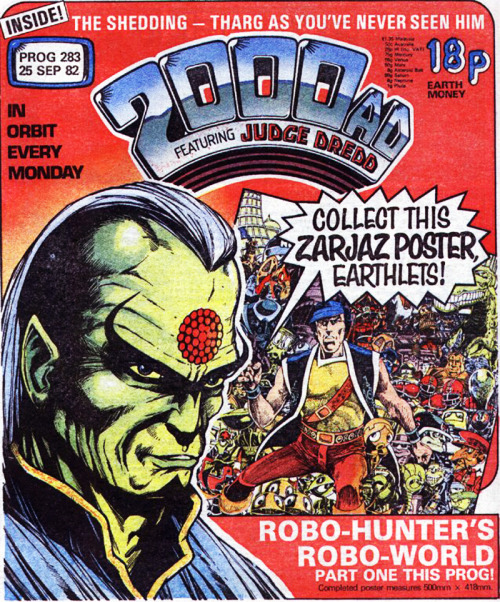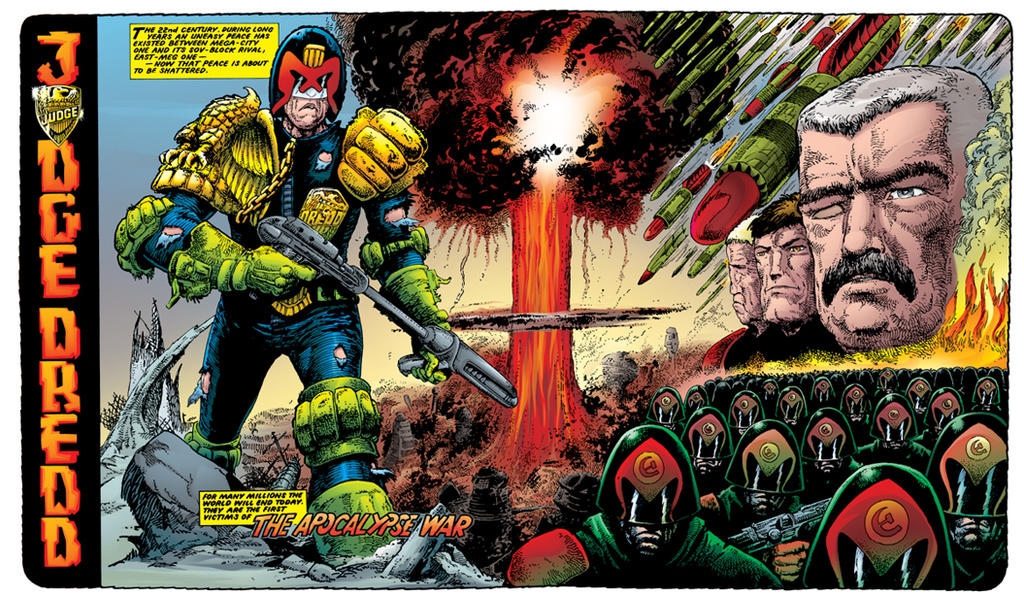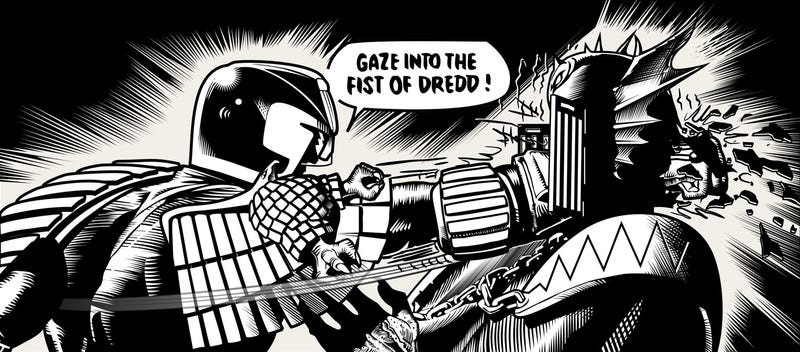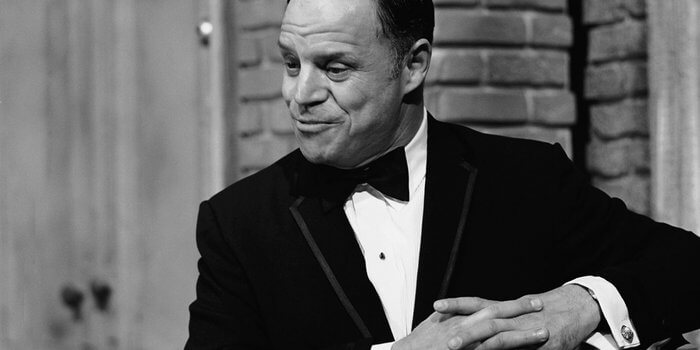Hey, wait, did you read part one?!?!

While 2000AD would be the comic of the anti-hero, the first issue presented by the green skinned alien editor Tharg the Mighty, had it’s fair share of contradictions for such an edgy comic. As was the tradition at the time with any new comic, the first few issues would come with a free gift to entice new readers. A childish “space spinner” toy was attached to the cover of issue one (most surviving issues front covers are therefore damaged but can still go for £100, however if you’ve somehow kept the spinner toy you can double that amount), which is at odds with the mature stories inside. The second issue at least came with the cooler tattoos designed to look like bionic, robot parts (which drew complaints from mothers when the tattooes proved difficult to wash off at bath time). Likewise the decision to bring back the clean cut Dan Dare from the long defunct Eagle comic while sound in gaining publicity proved an awkward fit despite an attempted 70’s revamp to the character.
Dan Dare could never shake the clean cut connotations of the 50’s original and wasn’t going to cut it as the poster boy for the heavily punk influenced comic. It was no matter, as by the time Dare vanished for good from the comic a couple of years later a brooding, violent anti hero who embodied the very essence of 2000AD attitude had cemented himself as the comic’s star attraction and would go to prove to be the one breakout star of the UK comic scene.

Judge Dredd
Ever since his appearance in the second issue of 2000AD, Judge Dredd has been a subversive joy, lending itself to interpretation. On the one hand his vicious methods in dispensing on the spot justice to criminals, caters cathartically to the reader’s desire to see bad guys get the right kicking they deserve. On the other hand from an anti establishment viewpoint you can read his inflexible attitude to upholding “The Law” and savage methods as a cutting satire of police brutality (the late 70’s saw many incidents of unrest and clashes with police in riot gear, not dissimilar to the uniform Dredd wore). There’s an obvious fascist tone to Dredd and the society he serves, particularly in his role of Judge, Jury and executioner with him deciding a perpetrator’s guilt on the spot and dispensing justice there and then, even if it’s a swift death penalty. His dedication to the law is almost a religious obsession and as far as his treatment of the population of Mega City One are concerned the ideas of serving and protecting rarely come to the fore, instead we see him almost as an agent of oppression.

Dredd has appeared in some of 2000AD’s most memorable sagas such as his many forays into the lawless lands of the cursed Earth that lay beyond Mega City One. (One such adventure landed 2000AD in legal issues when Ronald McDonald, Colonel Sanders and the Jolly Green Giant were used as characters in the episode Burger Wars and only recently with a change in the laws of copyright and parody has the story being allowed to be republished in full).
Possibly the best storyline (and my personal favourite) was the Apocalypse War saga where Mega City One is attacked by Soviet rival city East Meg One. During the brutal war Dredd leads the resistance against the invaders and in one unsettling scene rounds up citizens deemed guilty of collaborating with the Sov executes them in a pit, leaving a banner over their bodies branding them as “traitors.”
The war ends with Dredd taking control of nuclear weapons and using them to obliterate East Meg One, killing all 500 million of it’s citizens. It’s a shocking unflinching moment but is true to Dredd being the ultimate, merciless anti-hero.

In a rarity in comics, Dredd actually ages as his strip runs in real time as each year of 2000AD represents a year in the life of Mega City One (Dredd is currently in his 70’s and a story device where Dredd is not as fit and powerful as he once was is often used). Similarly the strip and character have developed through the years. In the second half of the 80’s and 90’s the subtle satire morphed to become more overt political commentaries, particularly around the issues of human rights.
When Mega City One’s population began to demand the reinstatement of a democratic state some of the strips greatest contemporary stories took place. A storyline “Letter from a democrat” detailing a citizen’s life under the rule of the Judges and her subsequent martyrdom kicked off a challenging saga that saw Dredd use extortion and blackmail to disrupt the protest movement in particular when working against a massive organised pro democracy march which even further made him an unsympathetic character and even at times coming across as the actual villain.

Later Dredd would come to soften his approach to the Democratic movement (a move that caused writer Alan Grant to quit the strip who wanted to take Dredd even further down the path of a facist), even supporting elections and later would become a supporter of rights for the cities oppressed Mutant population.
Following the career of Judge Dredd is possibly one of the most rewarding experiences in all of comics and has more depth than it is often given credit for.
– Dazza





